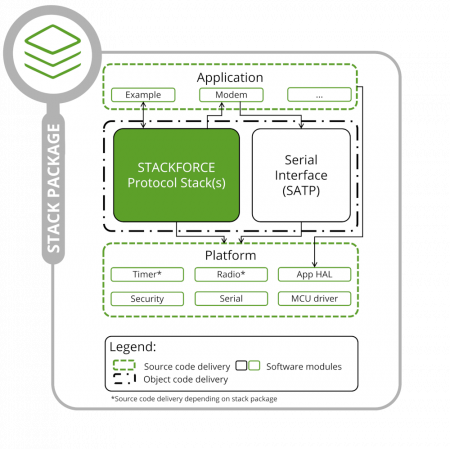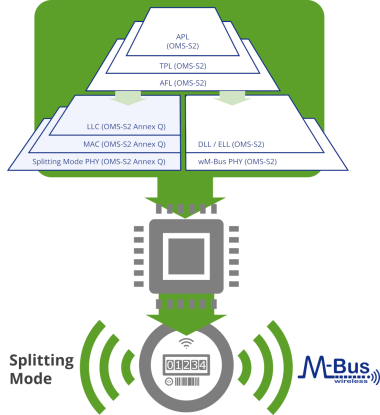OMS® v5.0.1 LPWAN UL-S1/S2 +wM-Bus C1
Dual Stack
Key Features

Compliant to EN 13757 and OMS® Specification, implementing Gen. 5
Annex Q “OMS® LPWAN”

Excellent robustness due to the implementation of the telegram splitting
technology

Significantly higher range of the new OMS® generation compared to OMS® v4 - thanks to splitting mode.

Pre-certification on reference
hardware platform
Your benefits with our stack package

Device interoperability
The OMS® v5 stack generation enables a high degree of device interoperability
Always connected
Fixed networks with Splitting Mode and wM-Bus C-Mode fallback for walk-by/drive-by
PLATFORM INTERFACE AVAILABLE AS SOURCE CODE
- Customization and fine tuning of platform driver
- Customization of radio settings (e.g., frequency)
Short time-to-market
With a directly available OMS® v5.0.1 Standard Stack you shorten your time-to-market significantly
Strengthen the future viability of your devices with this stack
Protocol Stack Features
OMS® v5.0.1
Unidirectional OMS® v5.0.1 LPWAN UL-S1 & UL-S1/S2
• Unidirectional Wireless M-Bus C-mode according to OMS® v5.0.1
• Telegram scheduler
• OMS® Security profile B
• Synchronous transmissions regardless of communication mode
Available for the following hardware platforms

Silicon Labs
EFR32FG23

Silicon Labs
EFR32FG28
Technical Information

Supported Specifications
OMS® v5.0.1 PROTOCOL STACK COMPLIANT ACCORDING
- EN 13757 and OMS® Specification,
implementing Gen. 5 Annex Q “OMS®
LPWAN” - TS-UNB – ETSI TS 103357
Reference Hardware
- EFR32FG23/28
Memory Requirements
The code sizes described above specify the typical required memory for operating the full featured protocol stack as a library including related drivers. Values based on EFR32FG23.
Contact us
Commercial Features
First level Support

High quality product

Easy comissioning & configuration

Warranty & maintenance


Do you have Questions?
We are happy to help you.
Our software products are very complex and even seemingly minor details can influence the scope of development services. For this reason, we would like to talk to you about your project.




